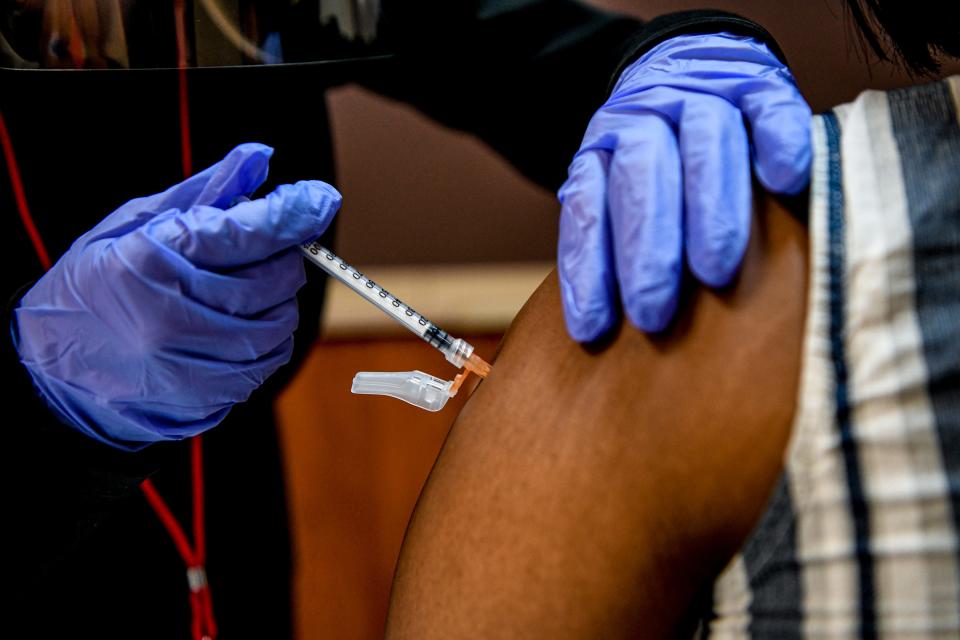It's time to get your COVID vaccination, experts warn. Here's why
- Oops!Something went wrong.Please try again later.
With the holidays comes COVID-19.
While COVID isn't spreading right now in Palm Beach County, post-Thanksgiving outbreaks have been a sure thing each year since the disease came here. Experts are urging everyone to get their shots now to prevent severe outbreaks.
WastewaterSCAN testing found 35 coronavirus particles per milligram Monday, about the same level as one month ago on Oct. 13 and lower than any of the three readings during the week of Nov. 13-19, 2022.
More: DeSantis health officials release numbers on Palm Beach County COVID deaths after lawsuit
COVID spiked in the weeks following Thanksgiving last year. Viral concentrations in sewage barely budged during the week ending Nov. 25 but spiked 38% the following week, WastewaterSCAN testing shows.

That's why the Centers for Disease Control and Prevention recommends getting COVID shots, along with immunization for flu and RSV.
CDC Director Dr. Mandy Cohen said recently that getting vaccinated as soon as possible will help protect people against sickness as they gather with friends and loved ones.
"We know when we travel, that virus moves around more, so we do expect more people to be getting sick, so protect yourself now," she said Thursday in an interview with KPRC in Houston.
Where you can get COVID shots
COVID shots are available in most pharmacies. Vaccine-seekers can use the federal website vaccines.gov to find places offering immunization.
Most insurance plans cover the latest vaccine designed to defend against more recent strains of the virus. Clinics in Palm Beach County, such as Lakeside Medical Center in Belle Glade, offer shots to the uninsured at varying costs, depending on ability to pay.
Meanwhile, a strain of hepatitis is spreading in Palm Beach County, the latest sewage test results show. And concentrations of rotavirus, a diarrhea-causing pathogen that mostly infects children, have plummeted.
From the CDC website: More on hepatitis A
Hepatitis A rose to its highest levels between Oct. 27 and Monday in north county wastewater since the Loxahatchee River District started testing for it two months ago, Jupiter-area sewage tests show. During the same period, rotavirus levels decreased 95%.
The Stanford University-led national WastewaterSCAN initiative found 18 rotavirus particles per milligram of rotavirus in district sewage in tests conducted Monday, down from 383 particles per milligram Oct. 27.
Rotavirus’ most common symptoms are severe watery diarrhea, vomiting, fever or abdominal pain, the CDC says. Ingesting rotavirus particles can spread infection, which can happen if one puts their unwashed hands in their mouth. Eating contaminated food also spreads the virus.
Frank Cerabino: Holy hell: The dangers in rising religious exemptions to school vaccinations in Florida
Google searches for “vomiting” in Palm Beach County and the Treasure Coast shot up fivefold from Oct. 26-31, before dropping 84%, publicly available search engine data shows. This dramatic spike did not happen statewide or nationwide.
Hepatitis A, meanwhile, has gone from zero to 30.5 fragments per milligram of sewage between Oct. 27 and Monday. That’s the most recorded since testing began Sept. 8. The district does not perform tests on other hepatitis strains.
How can you contract hepatitis A?
The vaccine-preventable contagious liver disease can be spread through contaminated food or drink, or when in intimate contact with someone, the CDC says. Symptoms, which can last up to two months, include yellow eyes or skin, loss of appetite, upset stomach, joint pain and diarrhea.
Another gastrointestinal virus, Adenovirus Group F, appears to be plateauing.
WastewaterSCAN found 16,212 viral particles per milligram of sewage Monday, a 73% drop from Nov. 8 but 60% higher than Oct. 25. The district started testing for this disease at the same time as hepatitis A.
Concentrations of the stomach bug norovirus remain about the same as in September but still higher than the summer. Test results Monday found 4,707 viral copies per milligram of sewage.
Chris Persaud is the data reporter for The Palm Beach Post. You can reach him at cpersaud@pbpost.com. Help support our journalism.Subscribe today.
This article originally appeared on Palm Beach Post: COVID-19 often spreads after Thanksgiving. Get your vaccination now

